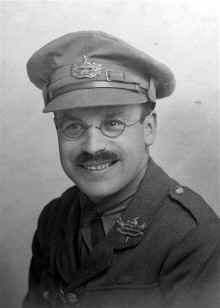Warning
Frederick William (FW) Harvey 1888 (Hartpury, Gloucestershire) – 1957 (Yorkley, Gloucestershire)
A man there was, a gentle soul,
Of mild enquiring mind,
Who came into this neighbourhood
Its wonders for to find [ … ]
They told him who had put the lid
On Lydney; who the ale
Misspelt in Aylburton. And he
Delighted in the tale.
And still, like little Oliver,
He softly asked for more;
And with the utmost courtesy
Was answered as before.
Until one sleepy summer's eve
He came all unaware
Unto a place called Ruardean,
And asked ‘Who killed the bear?'
The man arose and punched him flat;
Another punched his head,
And when the rest had done with him
Our gentle friend was dead.
The moral of this simple tale
Is plain. Dear friend, beware!
If you should visit Ruardean
Don't mention any bear.
If you should climb to Yorkley Slad
Pause not to question why
They put a pig upon the wall
To see the band go by.
And if your feet so far should stray
As Dymock, lest some hurt
Befall you, make no mention of
The man without a shirt.
Nine lives have cats, and you but one:
Risk not that gift of God!
It's better to be ignorant
Than dead beneath the sod.
Font size:
Submitted on May 13, 2011
Modified on March 05, 2023
- 1:02 min read
- 138 Views
Quick analysis:
| Scheme | XAAA XBCB XDCD XEFE XGXG BEFE AHXH XIXI FJXJ |
|---|---|
| Closest metre | Iambic tetrameter |
| Characters | 1,030 |
| Words | 205 |
| Stanzas | 9 |
| Stanza Lengths | 4, 4, 4, 4, 4, 4, 4, 4, 4 |
Translation
Find a translation for this poem in other languages:
Select another language:
- - Select -
- 简体中文 (Chinese - Simplified)
- 繁體中文 (Chinese - Traditional)
- Español (Spanish)
- Esperanto (Esperanto)
- 日本語 (Japanese)
- Português (Portuguese)
- Deutsch (German)
- العربية (Arabic)
- Français (French)
- Русский (Russian)
- ಕನ್ನಡ (Kannada)
- 한국어 (Korean)
- עברית (Hebrew)
- Gaeilge (Irish)
- Українська (Ukrainian)
- اردو (Urdu)
- Magyar (Hungarian)
- मानक हिन्दी (Hindi)
- Indonesia (Indonesian)
- Italiano (Italian)
- தமிழ் (Tamil)
- Türkçe (Turkish)
- తెలుగు (Telugu)
- ภาษาไทย (Thai)
- Tiếng Việt (Vietnamese)
- Čeština (Czech)
- Polski (Polish)
- Bahasa Indonesia (Indonesian)
- Românește (Romanian)
- Nederlands (Dutch)
- Ελληνικά (Greek)
- Latinum (Latin)
- Svenska (Swedish)
- Dansk (Danish)
- Suomi (Finnish)
- فارسی (Persian)
- ייִדיש (Yiddish)
- հայերեն (Armenian)
- Norsk (Norwegian)
- English (English)
Citation
Use the citation below to add this poem to your bibliography:
Style:MLAChicagoAPA
"Warning" Poetry.com. STANDS4 LLC, 2024. Web. 24 Apr. 2024. <https://www.poetry.com/poem/14294/warning>.



Discuss the poem Warning with the community...
Report Comment
We're doing our best to make sure our content is useful, accurate and safe.
If by any chance you spot an inappropriate comment while navigating through our website please use this form to let us know, and we'll take care of it shortly.
Attachment
You need to be logged in to favorite.
Log In